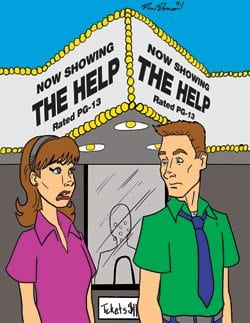
‘The Help’ and racial fault lines
| “I’m shocked to see some women in Mississippi were as hostile as the KKK.” |
“The Help,” a movie about the conflicts between black house servants and their upper class female employers in segregated Mississippi, has become an unexpected battleground. Some black critics of the cinematic portrayal of the interracial domestic controversy have been quite outspoken. However, it is difficult to discern the real nature of their protest.
Perhaps the problem is the lower socio-economic status of the maids. Some blacks were also critical of “Driving Miss Daisy,” a 1989 film starring Morgan Freeman as the even tempered chauffeur of an irascible, elderly Southern white woman played by Jessica Tandy. The criticism faded when it became clearly apparent that despite his servile position, the chauffer had the stronger character.
That distinction seems not to have much influence on the criticism of “The Help.” The white women are indolent and fatuous, and some are even incapable of looking after their own children. The black maids do the housework for the white women as well as care for their own families. One wonders if in the 22 years since “Driving Miss Daisy” blacks have lost the ability to “… judge people by the content of their character …” rather than the loftiness of the position that they hold.
The Civil Rights Act of 1964 made racial discrimination in employment a federal offense. For generations prior to that time it was extremely difficult for highly qualified African Americans to find professional level jobs. In Boston it was not unusual to find black Ivy League alumni working as red caps and Pullman porters. Black lawyers had to take jobs as postal clerks to support their families.
In Boston and elsewhere many talented blacks were forced either to work in service or join the ranks of the unemployed. During the era of the civil rights movement and before, blacks understood those circumstances and no one lost status because of the jobs they held. The late Melnea Cass was a prominent and respected black leader in Boston although she was the daughter of a janitor and a maid and she was once a domestic worker.
One wonders how black critics can take such exception to the characterization of the black maids in “The Help” while there was relatively little controversy over the 2009 film “Precious.” Indeed Gabourey Sidibe and Mo’Nique did not place black women in a favorable light. And there is little adverse comment about the neo-minstrel shows produced by Tyler Perry.
Some critics assert that “The Help” was not authentic because Kathryn Stockett, the author of the book that served as the foundation for the film, is a white Mississippian. And Tate Taylor, the film’s screenwriter and director, is a white man from Mississippi.
One the other hand, “Precious” was based upon a book entitled “Push” by Sapphire, a black writer. Racial commonality apparently made “Precious” real to some, although few blacks are personally familiar with the sordid incest that influenced the lives of the main characters.
Like other creative works, “The Help” will have to stand on its own merits. It will be judged by its artistic quality and not by the race or gender of the author. This is a universal standard from which black critics must not deviate despite any personal and emotional reaction to the subject matter.






